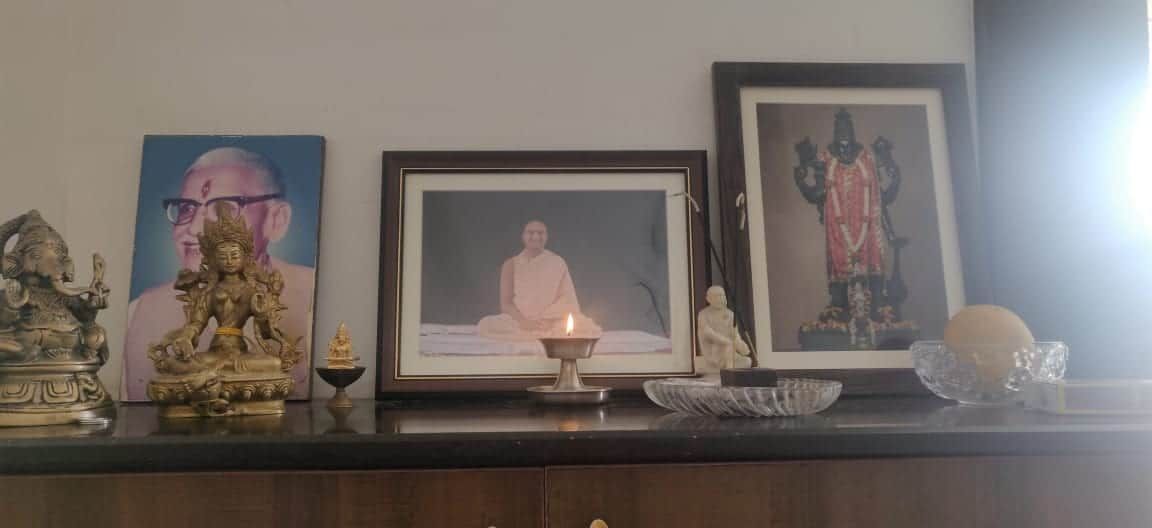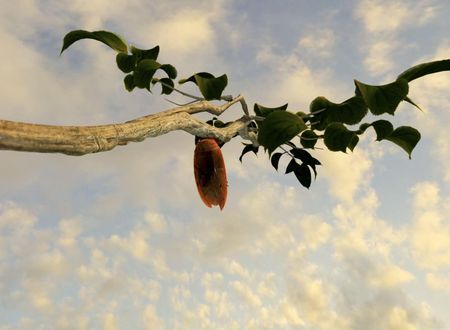Jai Sri Hari and a warm hug full of joy and contentment to my Om Swami family. It’s Swami’s birthday today, and as has been the tradition at my house, I made him some delicious kheer. Here is a virtual offering to all of you who are bound together by this silken thread of devotion to one of the most extraordinary spiritual masters to walk this planet.
Typically, on someone’s birthday, you give them a gift. However, Swami does not accept any material gift because he is then obliged by nature to return it in multifold. Hence, today I want to tell you about a gift he gave me as I completed Guru Sadhana.
I never ask for anything during my Sankalpa because Sadhana, for me, is simply a way to purify myself to receive grace. It’s an infinite game where I will get better with every single attempt till the subject and the object merge into each other. However, I went in with a question whose answer manifested for me.
The Question
We can all see that the country is seeing a massive attempt to revive the Sanatana Dharma. People are more cued into teachings of various masters, have strong opinions of how their culture is being depicted, and are starting to feel proud about their heritage.
However, as a side effect, people belonging to other religions, predominantly Islam, feel threatened by the current government. Some innocent people have been lynched, framed for sedition charges, and bullied. When I talked about it with friends, we concluded that this is a reaction to the government never acknowledging years of subjugation of the Sanatana Dharma under Islamic and British rule.
It somehow did to sit right with me. Even if it was a reaction, we had to find a better way. I love Urdu and Hindustani, have some wonderful non-Hindu friends, and love how Swami quotes and teaches from scriptures all across the world.
One day as I sat in Sadhana, an answer just manifested within me. “If the answer to any question is not compassion, then it’s the wrong answer.” There is a significant difference between intellectual insight and spiritual insight. I can tell you that confidently because I have experienced both in my life.
You arrive at an intellectual insight after thinking about a problem from multiple angles for a significant period. Your subconscious mind works on it and presents you with a possible solution when you are resting. That’s why Archimedes, Newton, and so many other innovators find answers when relaxing in bathtubs and under tress.
A spiritual insight is when you discover an answer that already lies within you. Instead of looking outside for different angles, you simply go within. When you empty yourself of preconceived notions, you make space for the insights to manifest themselves in your lives. As I spent time with this insight, I realized that compassion is the only answer, not because of any esoteric or spiritual reason. It’s simply the only state when you open yourself enough to receive grace. When you are angry or upset, even for legitimate reasons, you instantly move your attention from attaining liberation to more petty reasons like winning a fight or proving that you are right. Those emotions cloud your judgment and take over your lives till you purge yourself and start again. This is best explained by a true story I read in a Buddhist book. A Buddhist monk had just escaped a concentration camp in Tibet and reached Dharamshala to meet the Dalai Lama. He had clearly been tortured using a variety of mechanisms. When asked about his condition, he said, “the only thing I was scared of was that one day, I would start hating them. I was afraid I would lose my compassion.” There is simply no other emotion with the same power when it comes to rapid progress on the spiritual path.
Compassion in Action
The insight on compassion lifted a significant burden from my heart, but it still left me with a few questions. How do you implement compassion in situations of conflict or war? I was pondering over this question when I talked to one of my best friends, Prashant, a profoundly spiritual and very well-read individual. He told me about the stories of Emir Abdelkader and Guru Gobind Singh.
The Glory of Emir Abdelkader (Reference Wikipedia)
Wikipedia describes Emir as an Islamic scholar and Sufi who unexpectedly found himself leading a military campaign. He built up a collection of Algerian tribesmen that successfully held out against one of the most advanced armies in Europe for many years. His consistent regard for what would now be called human rights, especially regarding his Christian opponents, drew widespread admiration. He insisted on treating French prisoners with the same level of respect and dignity his own soldiers received. The French Army had to work overtime to stop the stories of the Emir’s generosity changing the minds of their soldiers.
His most significant act of compassion is the crucial intervention to save the Christian community of Damascus from a massacre in 1860. In July 1860, the conflict between the Druze and Maronites of Mount Lebanon spread to Damascus, and local Druze attacked the Christian quarter, killing over 3,000 people. Abdelkader had previously warned the French consul as well as the Council of Damascus that violence was imminent. When it finally broke out, he sheltered large numbers of Christians, including the heads of several foreign consulates and religious groups such as the Sisters of Mercy, in the safety of his house. His eldest sons were sent into the streets to offer any Christians under threat shelter under his protection, and Abdelkader himself was said by many survivors to have played an instrumental part in saving them.
Such acts meant that Abraham Lincoln honored him as a great humanitarian, and the New York Times wrote that he “deserved to be ranked among the foremost of the few great men of the century. Emir’s statue now graces the Geneva Red Cross headquarters.
Watch this video to learn more about Emir.
The Zafarnama of Guru Gobind Singh (Reference Wikipedia)
The Zafarnāma (Punjabi: ਜ਼ਫ਼ਰਨਾਮਾ, Persian: ظفرنامہ, lit. Epistle of Victory) was a spiritual victory letter sent by Sri Guru Gobind Singh in 1705 to the Mughal Emperor of India, Aurangzeb, after the Battle of Chamkaur. The letter is written in Persian script and verse. The most famous verse from the letter is shared here.
“Chun kar az hameh heelate dar guzasht,
Halal ast burdan bi-shamsheer dast.”
“When all has been tried, yet
Justice is not in sight,
It is then right to pick up the sword,
It is then right to fight
Despite losing his entire family in the slaughter, Guru Gobind Singh wrote reminds Aurangzeb how he and his soldiers had broken their oaths sworn upon the Qur’an when they promised safe passage to the Guru but launched a hidden attack of 100’000 men on forty famished Sikh soldiers. He tells Aurangzeb this was not a battle; it was a slaughter, and despite losing most of his Sikhs in this attack, he had won a moral victory over the Emperor who had broken his vows to Allah.
In the 111 verses of this notice, Sri Guru Gobind Singh Ji rebukes Aurangzeb for his weaknesses as a human being and for excesses as a leader. Sri Guru Gobind Singh Ji also confirms his confidence and his unflinching faith in the Almighty even after suffering extreme personal loss of his father, mother, all four of his sons, and many fellow Sikhs to Aurangzeb’s tyranny. Sri Guru Guru Gobind Singh then invites Aurangzeb to meet him in Kangar village near Bathinda (Punjab) and assures him the Brar tribe will not harm him (Aurangzeb) as they are under his command.
When the Emperor heard the letter, his peace of mind was shaken. He wrote a letter to his sons in which he stated, “I do not know who I am, where I am, where I am to go, and what will happen to a sinful person like me. Many like me have passed away, wasting their lives. Allah was in my heart, but my blind eyes failed to see him. I do not know how I will be received in Allah’s court. I do not have any hope for my future; I have committed many sins and do not know what punishments will be awarded to me in return”.
He ordered his armies not to harass the Sikhs anymore and sought a meeting with Guru Gobind Singh but died before meeting him.
Watch this video where the Zafarnama is translated into English to learn more about it.
Conclusion
These examples clearly layout out how compassion can be implemented even in the most trying of circumstances. When Emir and Guru Gobind Singh could do it in the heat of war, do you think it’s challenging for us to be compassionate to our own families, colleagues, or fellow devotees?
One of the best things that happened after I had this insight is that compassion became second nature. I still get irritated occasionally, but the next thought is that the other person does not deserve it, and I typically correct my behavior.
When it comes to Satana Dharma, we have to defend it, advocate for it, and if necessary, even fight for it but all under the codes of Santana Dharma. If we forget it, then even victory will be hollow and worse than defeat.
On Swami’s birthday, I submit this article at his feet and ask for blessings to live up to his teachings.









Comments & Discussion
51 COMMENTS
Please login to read members' comments and participate in the discussion.